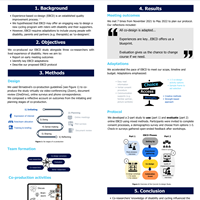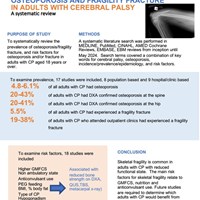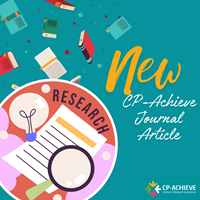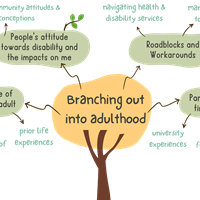Publications
-

How AAC Users Experience Good Mental Health and Get Support
Jacinta Pennacchia, speech pathologist and PhD candidate, explored how AAC-users experience good mental health and how they receive support for mental health.
-

Adapting Experience-Based Co-Design for Disability Research
John Carey, a CP-Achieve Research Associate, and colleagues explore how experience-based co-design (EBCD) can be adapted through co-production with people who have lived experience of disability.
-

Prevalence of and risk factors for osteoporosis and fragility fracture in adults with cerebral palsy: A systematic review
Using a systematic research method, this study by researchers in Australia, the USA and Canada reviewed the published research that investigated the proportion of adults with CP who experience bone fractures, or osteoporosis (bone weakness and fragile bones) and any risk factors for developing these conditions.
-

Assessing mental health of people with complex communication needs: A systematic review
Jacinta Pennacchia, a CP-Achieve PhD student at Murdoch Children's Research Institute, conducted a systematic review to identify and describe instruments used to measure wellbeing in people with complex communication needs
-

Exploring publicly available National Disability Insurance Scheme cerebral palsy data
CP-Achieve researchers examined publicly available information on the NDIS website to understand how people with cerebral palsy (CP) use their National Disability Insurance Scheme (NDIS) funding
-

Participating together in CP-ACHIEVE
The CP-Achieve Participation Theme team, comprised of young people with lived experience of CP and parents of young people with CP, collaborated together with health professionals and educators/researchers, to explore and understand participation experiences across the life domains.
-

Branching out into adulthood
Jaqueline Ding, a CP-Achieve PhD student at Monash University did a study to explore the participation experiences of adolescents and young adults with cerebral palsy (CP) in key life situations
-

How we developed an inclusive Framework and Toolkit to include AAC users in research
CP-Achieve researchers and One Group Our Voice, CP-Achieve’s Augmentative and Alternative Communication (AAC) user advisory group, worked together to develop ways to include AAC users in research
-

How do young people with CP build health literacy?
Jaqueline Ding, a CP-Achieve PhD student at Monash University did a study to find out how well young people with cerebral palsy (CP) understand health information (known as ‘health literacy’), how they learn about their health, and if this affects their quality of life. Melbourne.
-

Supporting people to be active and keep being active through their lifespan, in whatever activities they choose
Gaela Kilgour, a CP-Achieve Honorary Postdoctoral Research Fellow, completed her PhD in May 2022 and was supported by the CRE-CP and CP-Achieve. Three papers were published in September that focus on how we can support people to be active and keep being active through their lifespan, in whatever activities they choose.
A full list of CP-Achieve publications to date can be found here













